On Thursday a panel discussion titled “Discourse and Democracy” at town hall was organized by the First Selectman’s Youth Commission and featured an audience mostly of high school students.
The group is advised by the town’s Youth Services Bureau Administrator, Jean-Guillaume Sittol.
“Discourse for Democracy was inspired by our concern with increased global, national, and even local social and political correlation,” said Hanna Klingbeil, one of the organizers.
Sayah Trahanas who organized the event with Hanna, said each of the panelists represented different political affiliations.
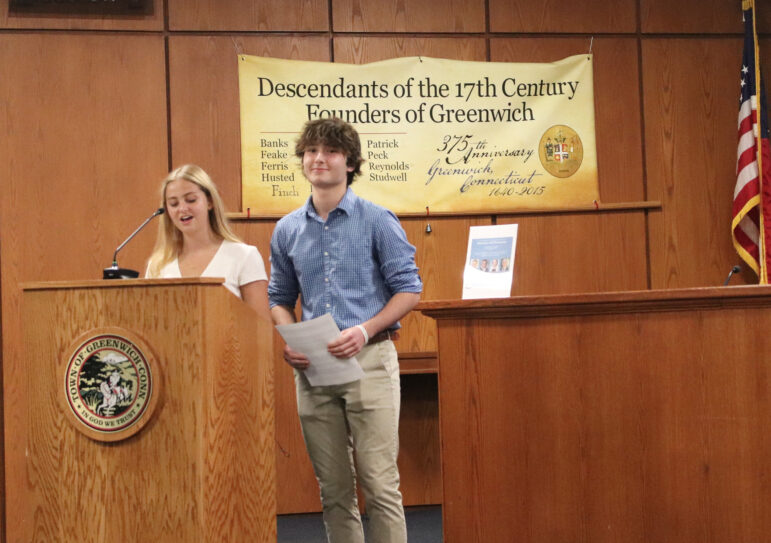
First Selectman Fred Camillo described himself as a blue collar conservative Republican who served 11 years in the legislature in Hartford. Prior to that he was a small business owner and worked in real estate for a time, in addition to being a high school history teacher briefly in New York.
Maryfrancis Metrick said she was on the board of advisors for Connecticut Voters First, which is focused on ranked choice voting, and a member of the National Board of the Forward Party which is a newly formed party.
John Blankley, a Democrat who ran as an independent for State Senate in 2021, served on the town’s Board of Estimate and Taxation and ran for higher office several times including most recently as an independent candidate for State Senate in a 2021 special election.
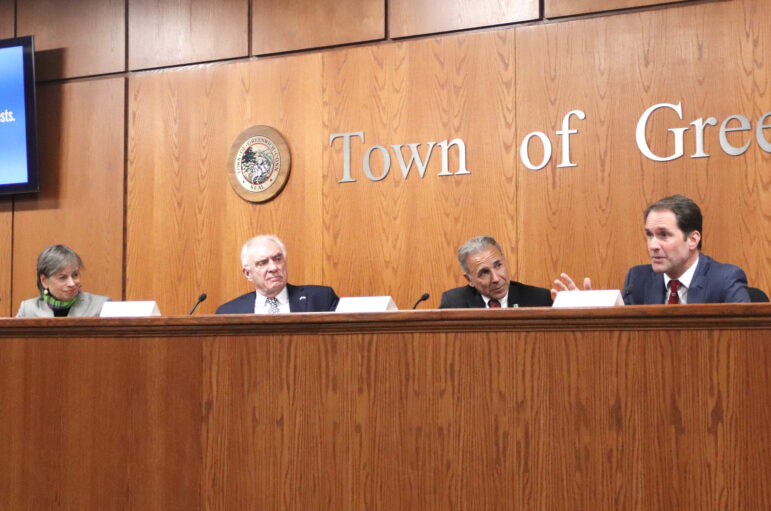
The fourth panelist was US Congressman for Connecticut Jim Himes who lives in Cos Cob. He has represented Connecticut in the House of Representatives since 2009.
Himes said years ago he and Camillo had been the chair of their respective town political parties at the same time.
Panelists shared different perspectives, thoughts, and experiences.
Questions focused on today’s political climate, political polarization, ranked-choice voting and open primaries.
Political polarization
Congressman Himes said said he was terribly upset with polarization in our politics and that parties have moved away from the center since he started in Congress in 2009.
“Disagreement, argument and debate are wonderful. There are countries where you don’t get to do that…You don’t want to live there – in North Korea, or Iran, or any of the countries where debate and disagreement is not welcome. The truth is that it’s the strength of our system, but it obviously boils over.”
Himes said he was one of the last members of the House of Representatives of the House chamber on Jan 6, 2021.
“That moment was really what happens when it goes not just wrong, but horribly wrong,” he added. “I’ve done a lot of thinking about how we try to recenter our politics around civility.”
He said with polarization, extremes of left and right begin to abandon the agreed upon framework for resolving disputes.
“On the far left, if you are a white male, your voice is less valuable than a traditionally oppressed…that’s sort of the illiberal instinct of the left,” he said. “On the right, it’s to some extent, as we saw with the last president, if I don’t like the results of an election – it was stolen. Those instincts are profoundly dangerous to the system.”
Commenting on polarization, Camillo connected it to gerrymandering and the resulting bluer and redder districts.
“(Candidates) then are in safe districts, but then they have to worry about a primary – if you’re a Democrat it’s from the left and if you’re a Republican, it’s from the right.”
Camillo also suggested social media was a culprit in political polarization.
“I can post something the most outrageous thing, and I guarantee I’d get 150 Likes in two hours, without any fact backing it up. That’s a problem because something is created on a narrative based on something that’s false.”
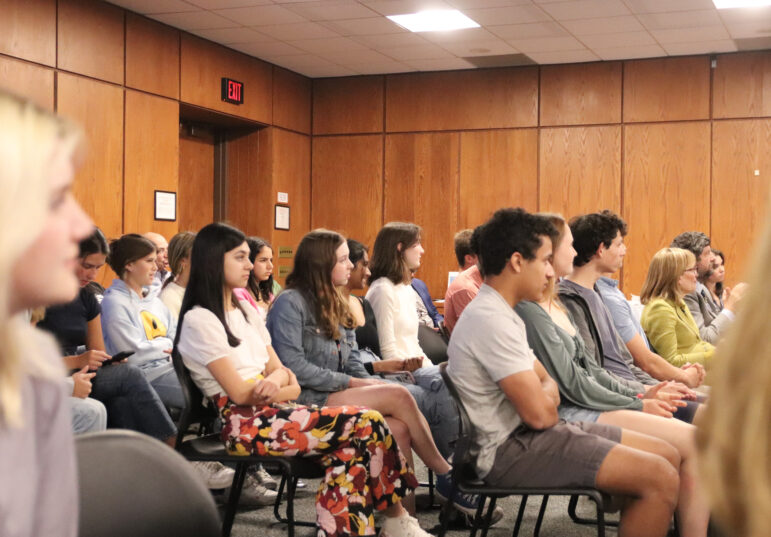
John Blankley recalled how his family came to the US from England as “refugees from Margaret Thatcher’s Britain.”
“When we came here, it was President Reagan, so we felt it was out of the frying pan, into the fire. But today’s Republican party, it’s unlikely Ronald Reagan would find a place,” Blankley said, adding that the Affordable Care Act in 2011, the tax cut in 2017, the Infrastructure Bill in 2021, and the Inflation Reduction Act in 2022 were all passed along party lines.
“There was no bi-partisanship in the construction of those bills,” he said.
Blankley said the Civil Rights Act in the 1960s caused the two parties to become more homogeneous, but most of the polarization was due to things that happened within the Republican party.
“They say famously, This is not your father’s Republican party,” he said. “It really is not Ronald Reagan’s Republican party. Now we have people like Gov Abbott in Texas who would pardon someone who killed someone in a demonstration. We have the Governor of Florida banning books an attacking the gay and trans communities. These are unacceptable behaviors.”
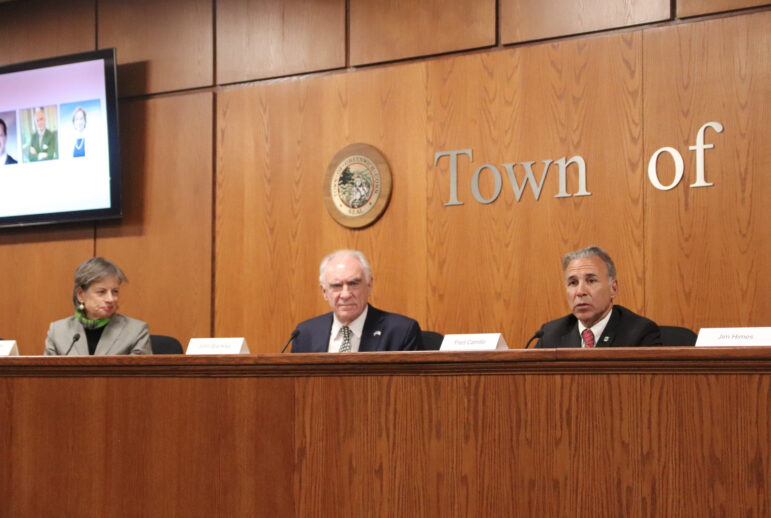
Ms Metrick cited Pew Research Report that indicated in the early 1970s there were 160 people in Congress who would have been considered moderates (30%), versus with about two dozen today (less than 5%).
“They have measured changes in the parties. The Democrats have become more left and the Republicans have gone much more to the right,” she said. “And the parties 50 years ago had much bigger tents.”
“You had a big tent. You had overlap. As a result it was possible to do bi-partisan legislation and get things done,” she said. “Today it shouldn’t be surprising that we aren’t able to decide what to do to extend the debt ceiling, and we’re putting ourselves in a crisis now.”
Metrick said closed primaries and gerrymandering exacerbated political polarization.
Blankley said candidates from certain southern states know they will face a primary challenge if they don’t conform to hard line positions.
“This is a problem,” he said.
Blankley also pointed a finger at Fox News for “awful and despicable rhetoric.
“If you have someone like Tucker Carlson proposing something he called Replacement Theory.”
Camillo said polarization was not a new phenomenon. He said the country cycles through periods of polarization, giving the era of the Vietnam War as an example.
“It became more civilized and then we had some blips on our radar ,and times when people were constantly at each other’s throats, and I think we’re at one of those periods now. But we always come back.”
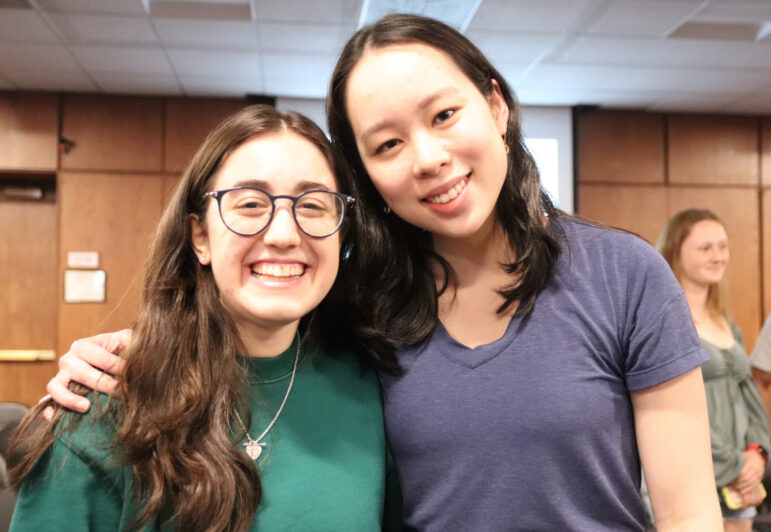
As for Mr. Blankley’s comment about Fox news, Camillo noted, “Equally, you could go on MSNBC and see some horrible things being said there, that if someone like myself said it, I’d have to go to sensitivity training for months, but they just get away with it.”
Camillo said history can serve as a guide, and today’s polarization would end. “We just didn’t have social media before and that is making it harder.”
Congressman Himes said there has been worse polarization in America’s history.
“We fought a Civil War in this country 100+ years ago in which hundreds of thousands of Americans died,” he said. “And in the early 1970s the Ohio National Guard opened fire on protesting Kent State students and killed a bunch of them.”
“Jan 6 was bad, but I would argue that it has been worse,” Himes added. “I think Vietnam is an example of that.”
Himes agreed that social media contributed to the problem.
“Yes we’ve always had aggressive propagandistic journalism,” he added. “Read the press when the country was being put together. When Madison and Hamilton and Jefferson were doing their thing, read the press. It’s horrible. …Social media is a little different because they have these algorithms. Facebook knows you, and they know what gets you engaged. And sadly, what gets you engaged is intense swings of emotion, in particular, outrage. They know how to provoke that.”
Also, he said, the political system today is more suffused with money, and saying something outrageous can result in an outpouring of donations.
“The Supreme Court has decided that money in politics is akin to free speech,” he added.
Ranked Choice Voting RCV
Panelists commented on rank choice voting where voters choose more than one candidate, instead ranking their favorite by order of preference.
Blankley said RCV had itself become a polarizing issue. He noted the organization called the Foundation for Government Accountability in Florida which argues RCV was being promoted by ‘far left Democrats.’
“This is an issue,” he said. “We have to counter that kind of rhetoric. They mask their true intent by saying if there are too many candidates on the ballot that is a problem….and results in lower voter turnout.”
“They are throwing sand in our faces,” Blankley said. “These are arguments that don’t stand the test. Really what they’re seeking to do is to make sure that candidates we would regard as extreme do get on the ballot. I think rank choice voting is one way that We the People can make sure that we make our choice and suppress some of the worst candidates.”
Camillo said he was a skeptical that Ranked Choice Voting would improve fairness.
“It’s going to create something where somebody may win fair and square, and work hard and then not get to that 50%, and have to do it again,” Camillo said. “And maybe a coalition of other candidates could get together and the next thing you know, that candidate that had the majority of people thought should have won, finds themself on the outside looking in.”
Mr. Himes said he was an unconditional supporter of Ranked Choice Voting as a way to empower the center, de-power the extremes and give voters more choice.
“If you’re a Democrat in 2016 and you’re really excited about Bernie Sanders, but in the back of your mind you say, to yourself ‘I don’t know if Bernie Sanders can win against Hilary Clinton.’ It allows you to cast your first vote for Bernie Sanders, and then say, ‘If I express my opinion I still have another bite at the apple, because my second vote can go to whoever else.'”
Ms Metrick said RCV inoculated against extremes. She said RCB was a structural reform.
“It’s clear that you don’t win in ranked choice voting unless you get the majority of the vote. It’s also an inoculation against fringe elements because if you have a number of candidates running, but you have strong support from a base of fanatics – unless you have ranked choice voting, there is a real risk that that could happen, so it is an inoculation against the extremes as well.”
Metrick said RCV had been used in Australia for 100 years.
She said RCV also allowed third parties to emerge and would help American Democracy get back on track.
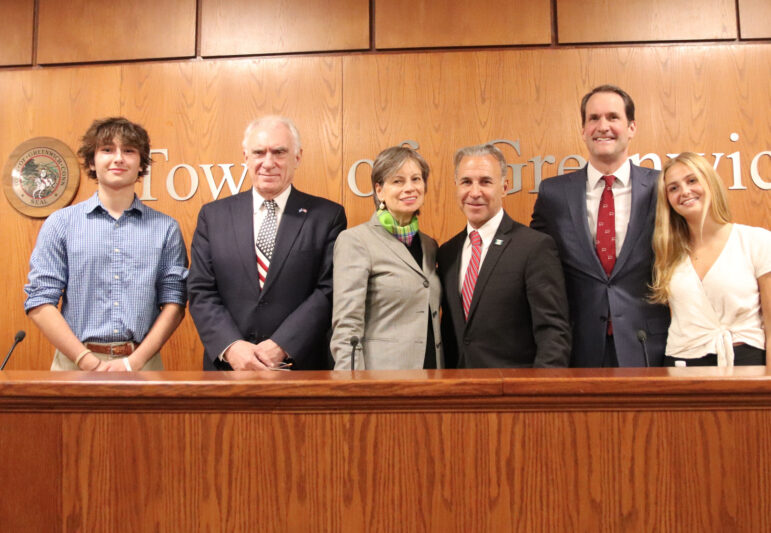
Open Primaries
Open primaries allow voters to participate primaries regardless of whether they are registered with a party. Closed primaries, which is the model in Connecticut, require people to be registered with a party to vote in their primary, but more than 40% of registered voters are not affiliated with a party, and are therefore excluded in the primary process.
Congressman Himes said he favored open primaries. He noted that in many towns in Fairfield County the single biggest registration is Unaffiliated.
“People who don’t want to affiliate with a party are completely excluded from the process of determining who goes on the ballot in November, and often times that is a pretty important role to play,” he said.
Himes said open primaries would moderate an otherwise fringe empowering process.
“Unequivocally allowing unaffiliated voters to vote in one party primary would go a long way helping reduce polarization.”
Metrick said it was a disgrace that taxpayers fund the party primaries and then get disenfranchised if they’re not affiliated with a party.
She advocated for a combination of Ranked Choice Voting and Open Primaries to give voters the most choice.
The result, she said would be four candidates in a primary instead of two, and combined with ranked choice voting at the general election, voters have even more choice.
Blankley said he was very supportive of the idea of open primaries. He said that when he came to America, initially he was unaffiliated, but when there was a primary for US Senator from CT, Joe Lieberman challenged Ned Lamont.
“I desperately wanted to vote for Ned Lamont,” Blankley said. “I discovered the only way I could do that was by joining the Democratic party.”
Camillo said while he didn’t support voters registered with a party voting in a party primary other than their own, he would support unaffiliated voters voting in a party primary but not people registered with a party voting in the other party’s primary. “It kind of brings it back to a centering.”
He did acknowledge that more electable candidates might emerge with open primaries.
Remedies for Polarization?
Himes said voters should start acting like responsible citizens.
“We are now in a world where friendships are being destroyed by political sentiment. We’re now in a world where a meaningful percentage of the American public thinks violence might be called for under certain political circumstances,” he said. “If you go home tonight and look at Facebook or Instagram and feel the rage emerging…and it’s a rage that hates Democrats or Republicans, or hates Donald Trump or hates Joe Biden – if that’s what you’re doing, then you’re not being a good citizen.”
Himes said that in Washington issues were complex. “Very little is black and white… If you see things in term of good-versus-evil, you are participating in the erosion of our democracy. I mean that for both sides.”
“Let me model this for you. I spent four years deeply uncomfortable with a Republican president, in a way I wasn’t with the two Bushes,” Himes said. “President Trump also passed a historic peace plan for the Middle East. President Trump actually had a few accomplishments.”
“We ought to do ranked choice voting. But at the end of the day, if we persist in being tribal and violent and enraged about our politics, all the structural changes in the world aren’t going to fix our democracy,” he added.
For remedies, Camillo said it was important to address gerrymandering.
Blankley asked the audience to imagine what districts would like with Artificial Intelligence applied to gerrymandering.
He praised Himes for making friends across the aisle.
Blankley said he wondered why three big issues where the will of the people was not being respected: abortion, guns, the environment.
“An overwhelming majority of citizens of this country feel there should be some form of abortion,” he said. “The background checks and assault…….so that we don’t have tyranny of the minority…”
Metrick said voters must engage more civilly. She praised Himes for introducing legislation for RCV in Washington, and noted that there was bipartisan support for it in Connecticut.
She recommended students get involved and that there were additional materials on RCV on CTVotersFirst.org.
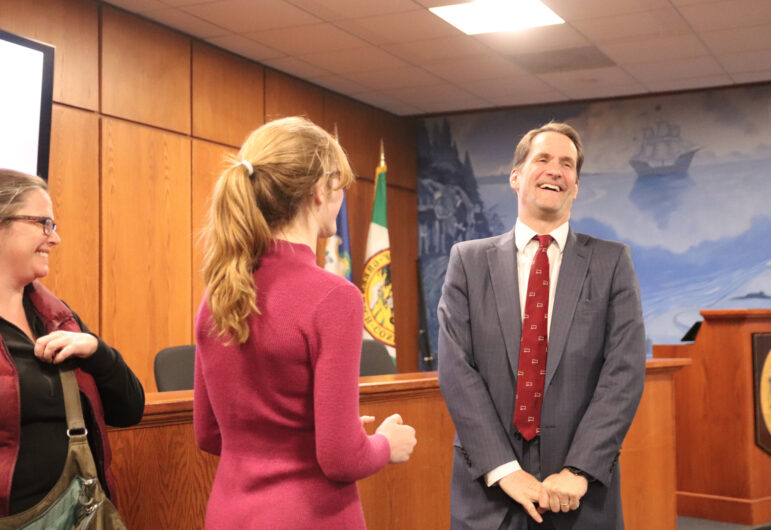
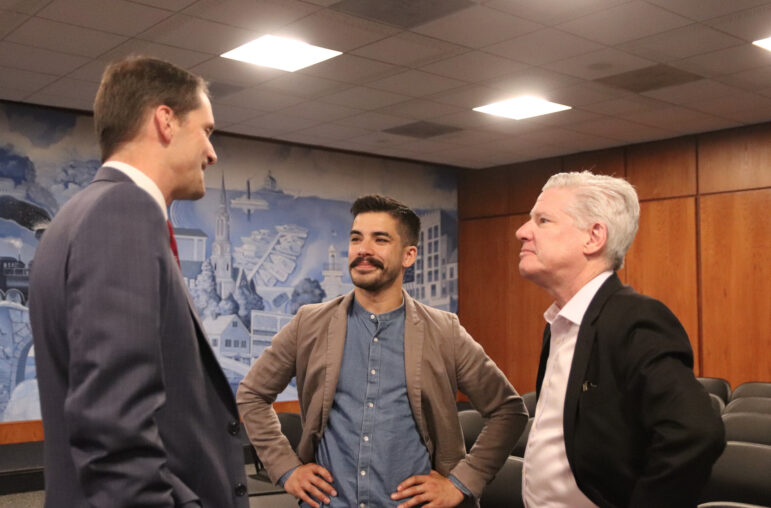
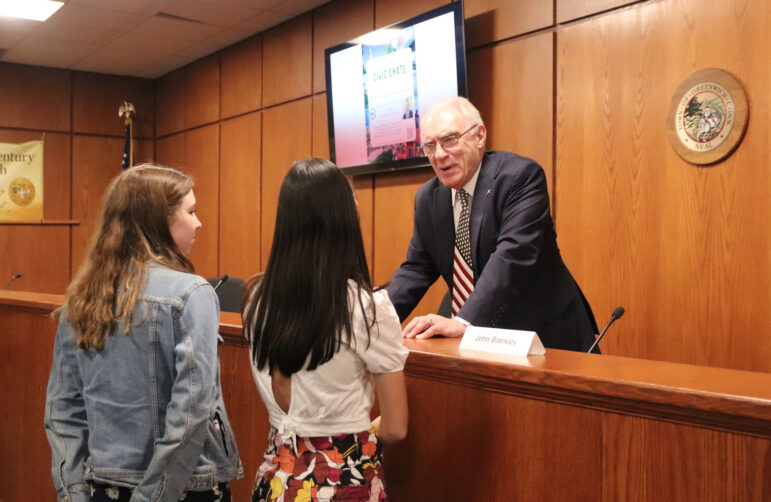
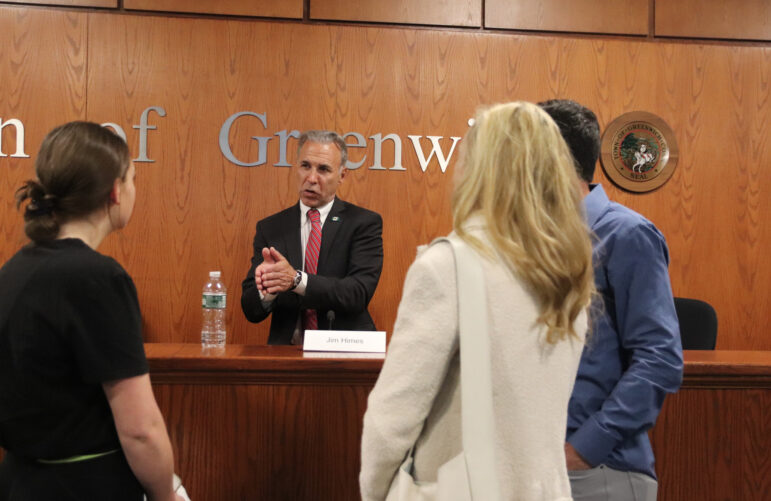
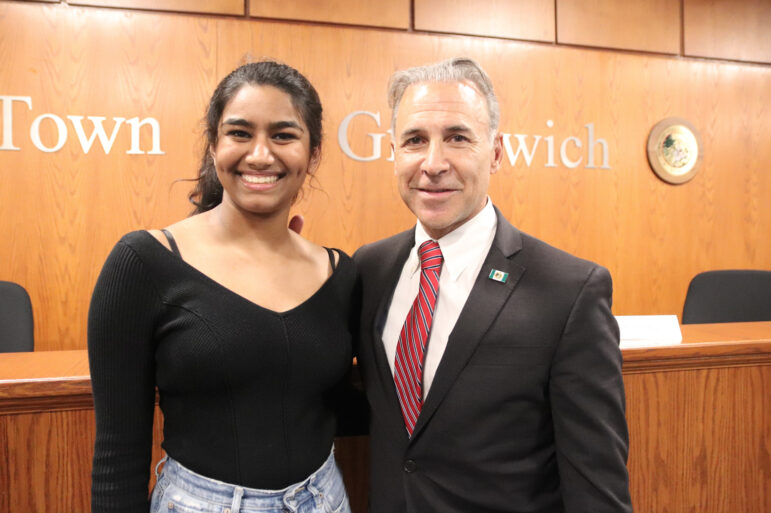
In other school news:
GHS Holds First Annual International Night
PHOTOS: Greenwich High School Theater Dept Stages Fiddler on the Roof